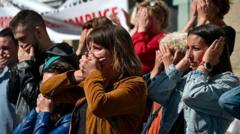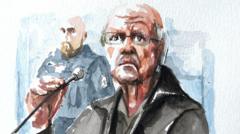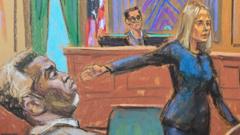**In Vannes, France, the haunting legacy of Joel Le Scouarnec's crimes challenges the nation to confront its uncomfortable silence over child abuse, as victims push for recognition and change despite a lack of public engagement.**
**A Cry for Justice: Le Scouarnec Case Highlights France's Silence on Child Abuse**

**A Cry for Justice: Le Scouarnec Case Highlights France's Silence on Child Abuse**
**Victims of the notorious paedophile surgeon demand accountability while facing societal indifference in a trial that reveals deep-rooted failure in confronting child abuse.**
The ongoing trial of Joel Le Scouarnec, a former surgeon identified as France's most prolific paedophile, signifies a crucial moment for victims advocating for justice amidst a backdrop of societal indifference. The proceedings, held in Vannes, Brittany, were intended to catalyze a national conversation about child abuse but instead have been met with disappointment and frustration expressed by victims like Manon Lemoine.
Despite Le Scouarnec admitting to raping or assaulting 299 individuals—predominantly children—the case has not garnered the public outrage seen in past trials, such as the Pelicot mass rape case. Lemoine, alongside dozens of other survivors, has formed an advocacy group aimed at highlighting what they perceive as government neglect toward their plight. This trial has opened the floor for many victims to step forward, revealing their identities in a bid to attract the nation's attention.
Regrettably, the lack of a parliamentary response, unlike previous abuse trials, calls into question why this case has failed to mobilize widespread public interest. Observers posited that the sheer number of victims might have overwhelmed potential support or cautioned that the distressing nature of child sexual abuse could inspire avoidance. Advocacy groups have pointed out the absence of a dominant narrative figure akin to Gisèle Pelicot from the previous trial that captured public empathy.
Lawyers for the plaintiffs have highlighted a deeper societal issue—the "systemic silence" surrounding child sexual abuse in France. Myriam Guedj-Benayoun, representing several victims, emphasized the cultural reluctance to confront this difficult subject. Le Scouarnec's case underscores a troubling pattern of institutional failures, as medical professionals overlooked critical warning signs of his behavior for years.
Throughout the trial, the depths of Le Scouarnec's depravity were revealed painfully, detailing his methodical abuses against vulnerable patients during and after surgeries. His documented descent into isolation and further criminal behavior provides a chilling testament to how unchecked authority can infiltrate the medical field.
As the trial nears its conclusion, enhanced media coverage has begun to highlight both survivors' testimonies and the bureaucratic negligence that allowed Le Scouarnec's crimes to exist undetected for decades. The profound trauma emerging from these experiences not only forces individuals to contend with their pasts but also creates a dire need for societal acknowledgment and action.
Victims have reported diverse reactions to the trial proceedings. Some have distanced themselves from the discourse due to the complexity of their experiences, while others have used the trial as a means of catharsis, discovering connections to their suffering through the collective narrative of abuse.
Despite the challenges they face, survivors like Lemoine express hope that their endeavors will instigate change. As the world watches France grapple with this complicated legacy of child abuse, the Le Scouarnec trial might finally compel the nation to acknowledge not only the evils it has permitted to fester but also its responsibility to ensure that such silence is broken moving forward.
Looking ahead, while some activists are cautiously optimistic about possible shifts in societal perceptions of child sexual violence, others remain acutely aware of the ongoing struggle between those seeking justice and those inclined to maintain silence. The outcome of this trial may, therefore, prove pivotal in determining whether France can truly address and rectify its collective complacency regarding child abuse.
Despite Le Scouarnec admitting to raping or assaulting 299 individuals—predominantly children—the case has not garnered the public outrage seen in past trials, such as the Pelicot mass rape case. Lemoine, alongside dozens of other survivors, has formed an advocacy group aimed at highlighting what they perceive as government neglect toward their plight. This trial has opened the floor for many victims to step forward, revealing their identities in a bid to attract the nation's attention.
Regrettably, the lack of a parliamentary response, unlike previous abuse trials, calls into question why this case has failed to mobilize widespread public interest. Observers posited that the sheer number of victims might have overwhelmed potential support or cautioned that the distressing nature of child sexual abuse could inspire avoidance. Advocacy groups have pointed out the absence of a dominant narrative figure akin to Gisèle Pelicot from the previous trial that captured public empathy.
Lawyers for the plaintiffs have highlighted a deeper societal issue—the "systemic silence" surrounding child sexual abuse in France. Myriam Guedj-Benayoun, representing several victims, emphasized the cultural reluctance to confront this difficult subject. Le Scouarnec's case underscores a troubling pattern of institutional failures, as medical professionals overlooked critical warning signs of his behavior for years.
Throughout the trial, the depths of Le Scouarnec's depravity were revealed painfully, detailing his methodical abuses against vulnerable patients during and after surgeries. His documented descent into isolation and further criminal behavior provides a chilling testament to how unchecked authority can infiltrate the medical field.
As the trial nears its conclusion, enhanced media coverage has begun to highlight both survivors' testimonies and the bureaucratic negligence that allowed Le Scouarnec's crimes to exist undetected for decades. The profound trauma emerging from these experiences not only forces individuals to contend with their pasts but also creates a dire need for societal acknowledgment and action.
Victims have reported diverse reactions to the trial proceedings. Some have distanced themselves from the discourse due to the complexity of their experiences, while others have used the trial as a means of catharsis, discovering connections to their suffering through the collective narrative of abuse.
Despite the challenges they face, survivors like Lemoine express hope that their endeavors will instigate change. As the world watches France grapple with this complicated legacy of child abuse, the Le Scouarnec trial might finally compel the nation to acknowledge not only the evils it has permitted to fester but also its responsibility to ensure that such silence is broken moving forward.
Looking ahead, while some activists are cautiously optimistic about possible shifts in societal perceptions of child sexual violence, others remain acutely aware of the ongoing struggle between those seeking justice and those inclined to maintain silence. The outcome of this trial may, therefore, prove pivotal in determining whether France can truly address and rectify its collective complacency regarding child abuse.




















